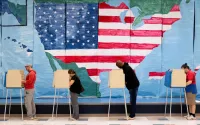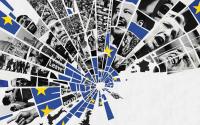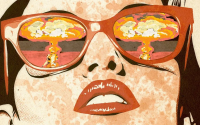24 March 2005Znet
Sydney Hyde Park, 20 March 2005: The other day, the Aboriginal film-maker Richard Frankland said this: "When you've got a voice, you've got freedom, and when you've got freedom, you've got responsibility. Negotiating with politicians doesn't work. You've got to change attitudes." That's the task for all of us here today. It's not an easy one. In fact, many good people in Australia and other countries believe their voice cannot possibly be heard: that the forces of bigotry and violence are far too powerful. And yes, they are powerful. John Howard can lie repeatedly to the Australian people and get away with it - it seems. There is no Labor opposition in federal parliament. They've become a bad joke, to the point where Kevin Rudd, the opposition spokesman on foreign affairs, refuses to say anything critical of the government that is not immersed in crude sophistry. We also know that those who are paid to keep the record straight, who are meant to challenge Howard's lies and uphold our right to freedom of speech, a freedom that is a cornerstone of any true democracy - I refer of course to the media: journalists, broadcasters - we know where they stand. We know that, apart from a few honourable exceptions, they are not merely craven and silent, but occupy a place in this society not dissimilar to the media in the Stalinist regimes of Eastern Europe. Throughout my career I have reported, often undercover, from countries ruled by repressive regimes where dissidents would read me reports in the press that were no more servile and false than the reporting you read every day in the Murdoch papers in this country. In Eastern European states, for example, the papers had tame correspondents in Moscow, who would parrot the Kremlin line. Now read the Washington correspondent of the Sydney Morning Herald, Michael Gawenda, and there is no difference. The same parrotting of Bush's dangerous absurdities, such as his claims of bringing democracy to the Middle East - when the very opposite is true. Considering this, we might ask: Is there no shame? Is there no shame that, in its annual review of press freedom three years ago, the international media monitoring organization, Reporters Without Borders, placed Australia 41st in the world. Countries with greater press freedom were the following: Lithuania, Bosnia, El Salvador, the Dominican Republic, Bulgaria, Hong Kong. All these countries have either been run by dictatorships, or racked by war or by civil upheaval; yet in 2002 they had greater press freedom than Australia, which was just ahead of autocracies. None of this, or the reasons why, are ever mentioned at the numerous back scratching awards ceremonies so beloved by the Australian media. Honourable exceptions aside, supine journalists, like cynical opposition politicians, like corporate academics, represent unaccountable, violent power and a corrupt democracy that today offers us no more choice that between a McDonalds and a Hungry Jack's. But they do not represent us. And they do don't speak for us. And they don't speak for humanity. And they don't speak for democracy. And they don't speak for all the moral decencies by which most people live their lives. In fact, they speak for the very opposite. I may have first understood this when I reported from repressive Czechoslovakia, with its Stalinist regime, in the 1970s. The dissenters who spoke out in that country seemed so few, yet I wondered why the regime went to such lengths to silence them and attack them and sneer at them, usually via the state press. I put this question to the great protest singer Marta Kubisova, whose thrilling voice sang the anthems of the Prague Spring in 1968. Meeting me in secret, she replied by reading to me the words of one of her most defiant songs, written by a banned Czech group called the Plastic People of the Universe. I have abridged it slightly. They are afraid of the old for their memory,They are afraid of the young for their innocenceThey afraid of the graves of their victims in faraway placesThey are afraid of history. They are afraid of freedom.They are afraid of truth. They are afraid of democracy.So why the hell are we afraid of them? ...for they are afraid of us. What all of you should remember on this second anniversary of the brutal assault on Iraq is that you are not alone: that you are part of a great worldwide movement that refuses to accept the dangers and moral indecencies of Bush and Blair and Howard. Yesterday, all over the world, people, like you, expressed their defiance and anger at the unprovoked attack on Iraq, a defenceless country, and the killing of more than 100,000 people and the theft of their resources and their poisoning of their land: all of it justified by demonstrable lies. Go back to a speech John Howard made early in February 2003. He spoke for 53 minutes and lied about weapons of mass destruction at least 20 times: 20 lies in less than an hour. Even Bush and Blair would have trouble topping that. Then he sent Australian troops off to take part in an invasion which, under the universally acknowledged and respected terms of the Nuremberg judgement in 1946, the cornerstone of international law, was, "a paramount war crime". That's not my rhetoric, nor is it agit-prop. It's the law of civilized people. And it's our job to help people understand the great crime committed in their name, and how those who claim to speak for us, such as the media, have normalised the unthinkable: as if no crime has been committed, as if thousands of people have not been murdered, as if it was all merely a respectable adjustment of the 'world order'. My point is, they are not respectable; they may wear the suits of respectability and travel with their fawning courts, but they are prima facie criminals, be assured. The other day, an ABC foreign correspondent was promoting his book of professional adventures in a Sydney bookshop. He told his audience that it was good to be back in a country where politicians at least didn't kill each other. That's true, but what he didn't say was that the same politicians collude in the killing of men, women and children in other countries: in Falluja, where the truth remains unreported in the so-called mainstream media in this country - including the ABC, which has allowed itself to be intimidated by the Howard government for giving us, now and then, a glimpse of the truth about Bush's criminal assault on Iraq. The time is long overdue. That time is for journalists to break ranks and speak up. It's time for teachers to write on their blackboards that great truism of Milan Kundera: "The struggle of people against power is the struggle of memory against forgetting." It's time for those who know the dangers, but who say nothing - academics, lawyers, union leaders, even members of parliament - to break their silence before their own privileges are undermined by the steady assault on centuries-old, hard-won civil rights, vividly expressed in the abandonment of Australians tortured in other countries by their government and the locking up of people in this country indefinitely: indeed the erosion of the bedrock of our justice system: innocent until proven guilty. Above all, never forget how important and right you are. It is you, in company with millions all over the world, who have taught again the great lesson of democracy. You didn't stop the invasion of Iraq, but you, and the millions like you, in Spain and Britain and France and Italy and Brazil and the United States, have alerted the world to the true darkness of the regime in Washington and its collaborators. Never in my lifetime as a journalist have I known ordinary people all over the world to be more aware of the dangers and the issues that face us. Many can't be with us today; but their support is, I believe, a presence. Think back to the popular movement, much of it led by women, that prevented conscription being introduced in Australia during the Fiirst World War. Those campaigners also felt rather isolated at times; but they weren't:: they were the voice of what was right. Had it not been for you and your movement, I believe Iran and North Korea would have been attacked by now, and in the case of North Korea, nuclear weapons might have been used. Be proud of these achievements: be proud that the seedy, violent power of Bush and Blair and Hoaward has been exposed by you and that behind their bravado, they are afraid of you, and of the millions like you, so, in the words of the song, why the hell should we afraid of them?






